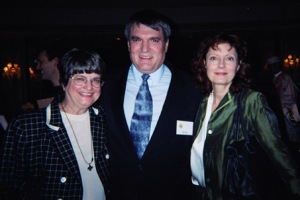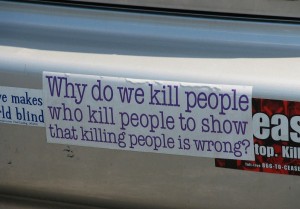Elaborating arguments to convince public opinion
Influencing public opinion was acknowledged across the 3 days of the World Congress to be a key challenge facing the abolitionist movement. In some countries, and States of the USA, even those which are currently without the death penalty, point-in-time polls have revealed staggering public support for executions. There are some massive caveats around this which we’ll revisit in other posts in coming days, however the point is that some governments are hiding behind ‘the will of the people’ to refuse to even begin to negotiate on terms for abolition. Furthermore, we mustn’t forget that even in Europe, where we are lucky to have almost total rejection of capital punishment at statutory and constitutional level, this remains an emotive topic; so popular that it’s not inconceivable pressure could increase to reinstate it in some regions ‘for the worst crimes’. Of course in Europe this would never in all likelihood gain traction given the steadfast position of the European Union on Human Rights; but it remains important to consider, as a general theme, arguments which we can draw on to remind people or persuade them that the death penalty is a bad thing. So it was useful to hear in this session about two very personal perspectives which campaigning groups are drawing on to attempt to remind the public at large why the death penalty makes no sense.
Wrongful conviction, exoneration and enlightenment
In this workshop we heard from Joaquín José Martínez, a former death row inmate of Florida, now exonerated and living in Spain, and from Bill Pelke, co-founder of ‘Journey of Hope’, whose grandmother was murdered. The panel was moderated by David Lindorff, a freelance journalist and author of ‘Killing Time’, a report on the facts surrounding the case of Mumia Abu-Jamal.
Joaquín told us his story. He had once been an arrogant upstart, a supporter of the death penalty and blessed with a good upbringing and education. He used to say things like ‘Why wait to execute ’em?’ He was a successful business man in his early twenties with two young daughters, and already going through a somewhat acrimonious divorce. Now, he looks back and knows, from what happened to him, and from what he witnessed while he was on death row, just why he was so wrong.
In 1996 a double homicide in Tampa, Florida, occurred. There was a huge public outcry to find the killer and see justice served, augmented by the fact that the victim was the son of a local sheriff. Altogether 12 suspects were arrested in connection with the killings, and Joaquín was one of them – but why? It transpires that his estranged wife decided to incriminate him out of spite, perhaps not fully cognisant of the potential outcome. She told police that he had given her information which would appear to implicate himself, and that she had it on tape. In short, Joaquín was convicted on the basis of an alleged confession, and one way or another the police managed to stitch him up completely with ‘lost’ evidence, inaudible recordings and the unreliable testimony of his embittered ex-wife. In his arrogant naivety, and given the lack of any evidence anyway, Joaquín had not really believed that he would come badly out of his trial and had engaged his personal business lawyer to defend him, rather than spend decent money on a fully competent lawyer.
Subsequently, in 1997, Joaquín ended up on death row. Even as recently as that, the default method of execution in Florida was the electric chair. Joaquín tells how the prison would test the chair every week, and the effect that had on the inmates. The row would be quiet and still; he recalls hearing inmates crying as the lightbulbs dimmed along the block. Is this not mental torture?
Eventually, with the help of his parents and family back in Spain, Joaquín managed to raise enough money (about $1 million) for a ‘proper’ defense and his case was eventually appealed and overturned. Through the love of those who believed in him, he managed to gain the support of senators, press, and a retrial at which the maximum sentence available would be life in prison. But he was freed. He now lives in Spain, but stays in touch with his daughters, speaking to his ex-wife daily.
Joaquín understands the emotions that someone feels when you lose someone to violent crime. Hate, rage, desire for vengeance, these are all things he himself had the misfortune to endure when his own grandfather was later killed. But he acknowledges that he could have seen the perpetrator electrocuted a hundred times over and the pain of loss would not be lessened. Today Joaquín tours, speaks and campaigns against the death penalty.
Forgiveness vs revenge
Bill Pelke pointed out that exonerees are not saved by the system, but in spite of it. He said the death penalty is cruel and it is unnecessary, not just to the condemned, but to their families as well.
‘As long has human beings make decisions, they will make mistakes,’ he said. ‘But people will listen to other people’s stories, it’s very compelling.’
Journey of Hope knows that if you can touch people’s hearts you can change their minds. So it is murder victims’ family members who lead the association, which also includes families of the condemned, of the executed, exonerees and general activists. They undertake speaking engagements and tours to reach out to communities, schools and other groups, to help them to understand that there are no number of retaliatory deaths that can replace a loved one. He quoted that the death penalty is nothing more than the ‘animal instinct for gut-level, bloodthirsty revenge.’
Bill and his colleagues believe that love and compassion is the answer. Healing is what victims need, not revenge. Bill himself lost his grandmother to murder… And knew that she would have been horrified to think her murderer would perish in turn. Forgiveness is what has helped Bill to heal.
Bill told us about his grandmother’s killer, Paula Cooper. She was only 15 in 1985 when the murder occurred, but this was prior to the introduction in the USA of legal prohibition of the execution of minors, and so she was sentenced to death. At first, Bill was glad, and wanted nothing more than to see his gentle grandmother’s killer executed; but then upon reflection he came to realise that his grandmother, a Bible teacher, would have wanted compassion. After her conviction, news of the young girl being condemned reached Italy, and a campaign was begun there to petition for Paula Cooper’s life. Bill could scarcely believe the strength of compassion coming from abroad, as in his home state of Indiana everyone wanted the girl dead, and as soon as possible. Ultimately, the state legislators were extremely embarrassed by the international attention and raised the age limit for death eligibility to 16; but no mercy for Paula. Eventually, with Bill speaking out at every turn to say he did not want the girl to be executed, the sentence was commuted to 60 years in prison.
In 2014 Paula Cooper will become eligible for parole. She committed her crime and was condemned at 15. Upon release she will be 44 and a completely different person. Bill has remained in close touch with her over the years, and knows she will need tremendous support and rehabilitation to re-enter the outside world.
‘On the day Paula is released, I will meet her at the gates,’ said Bill. ‘She has already agreed to come with me wherever I want to go. “You saved my life,” she tells me’.
Bill has plans to take Paula touring with him and Journey of Hope to continue telling their story of violence, hurt, lives lost and lives saved, and the reconciliation that has ultimately enriched and directed Bill’s own life.
So in conclusion, the theme of the session was to set the scene for an elaboration on a few of the reasons why the death penalty needs to be abolished, via a pair of extremely close-up and poignant perspectives.
- The innocent man condemned, who escaped death, and has learned to forgive and completely turned his youthfully ignorant views on their head.
- And the victim’s family member who not only forgave his grandmother’s killer, but was instrumental in saving her and is a role model for reconciliation and restoration.



